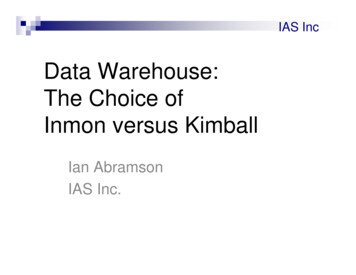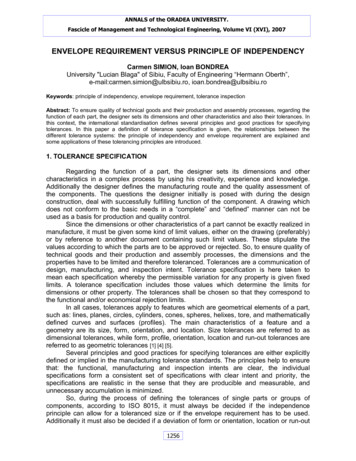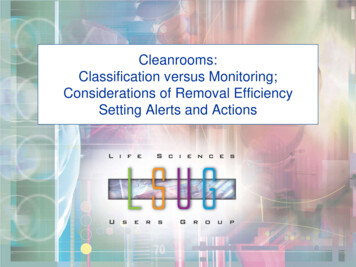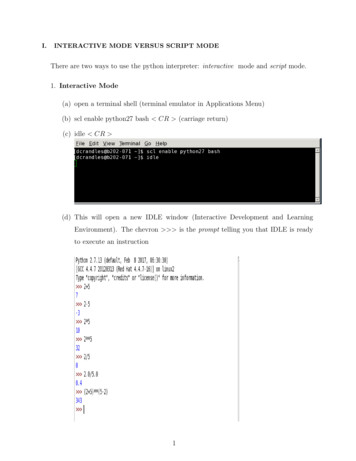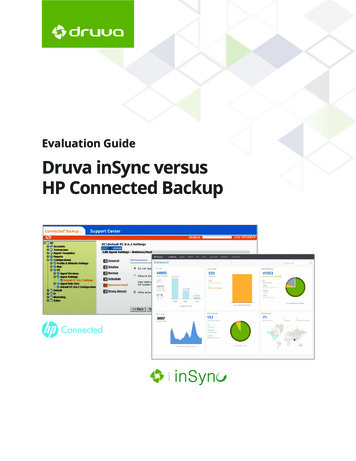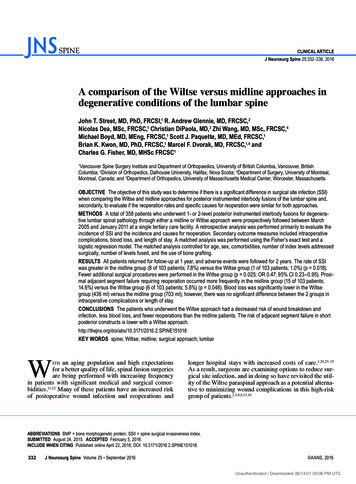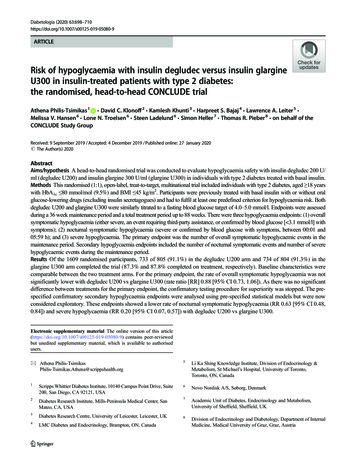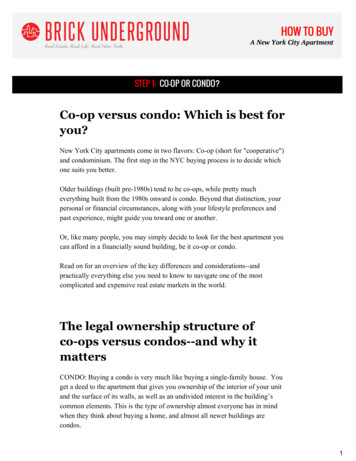
Transcription
HOW TO BUYA New York City ApartmentSTEP 1: CO-OP OR CONDO?Co op versus condo: Which is best foryou?New York City apartments come in two flavors: Co op (short for "cooperative")and condominium. The first step in the NYC buying process is to decide whichone suits you better.Older buildings (built pre 1980s) tend to be co ops, while pretty mucheverything built from the 1980s onward is condo. Beyond that distinction, yourpersonal or financial circumstances, along with your lifestyle preferences andpast experience, might guide you toward one or another.Or, like many people, you may simply decide to look for the best apartment youcan afford in a financially sound building, be it co op or condo.Read on for an overview of the key differences and considerations andpractically everything else you need to know to navigate one of the mostcomplicated and expensive real estate markets in the world.The legal ownership structure ofco ops versus condos and why itmattersCONDO: Buying a condo is very much like buying a single family house. Youget a deed to the apartment that gives you ownership of the interior of your unitand the surface of its walls, as well as an undivided interest in the building’scommon elements. This is the type of ownership almost everyone has in mindwhen they think about buying a home, and almost all newer buildings arecondos.1
CO OP: In New York City, co ops far outnumber condos. In a co op, the entirebuilding is owned by a single corporation. Instead of a deed, buyers get shares(stock certificates) in the corporation, and a proprietary lease that allows buyersto occupy a specific unit and lays down the rules and rights much like a lease ina rental building. In fact, technically speaking, buyers of co op apartments arereferred to as “tenants” or “shareholders,” not “owners," and when legal issuesarise, they are decided in accordance with landlord tenant law, which typicallygives co op shareholders more protections than the laws that apply to condoowners.After you buy your apartment, you will largely find that it's legal ownershipstructure has little impact on your use of it. That said, there are a number ofquirks related to each that will be discussed on the following pages.Co op boards versus condo boards: Astory of unequal powerIn a CO OP, shareholders elect a volunteer co op board that except in somevery small buildings that choose to save money by self managing works with aproperty management company to oversee the care and maintenance of thebuilding.The board also creates and enforces rules about everything from renovationinside units, to what’s allowed to transpire on the roof deck, to whether you canspeak on your cell phone in the lobby, or whether (and what kind of) dogs willbe allowed in the building. Unlike condo boards, co ops can even evict anextremely disruptive shareholder and force them to sell their apartment.Overreaching, power hungry co op boards are the stuff of legend here, andsome of the stories are true. However, at least as many co op boards are madeup of volunteers with full time jobs and families who try to make the best ofwhat is a demanding and time consuming role if done right.In a CONDO, individual owners elect a board of directors that perform many ofthe same functions as a co op board. Generally speaking, though, most condoboards tend to be more hands off when it comes to rulemaking.That slightly more laissez faire approach is partly due to philosophicalunderpinnings (more on that on the following pages) and partly because condoboards legally wield less enforcement muscle. Yes, the board can fine ownersfor the expense related to any rule infraction and get a court ordered injunction2
to stop it from happening again. But because a condo owner actually owns hisor her unit (versus shares in a co op corporation), a condo board can’t evict anowner from an apartment like a co op board can.Note: In both co op and condos, your voting power increases with the size ofyour apartment.Monthly charges and assessments:Condos may seem cheaper but don'tbe fooledIn a CO OP, shareholders pay a monthly maintenance fee. Part of it goes towardthe expense of operating the building. The other part is the amount of propertytaxes apportioned to each shareholder based on the number of shares assigned totheir apartment. Particularly these days, when property taxes and fuel costs arerising sharply, maintenance fees are frequently adjusted upward each year(3% 7% annual increases are quite common).In addition, co op boards can require shareholders to pony up extra cash fromtime to time to boost the reserve fund or pay for a specific project. In a 40 unitbuilding, for example, an assessment to replace an elevator might run 8,000 15,000 per unit, depending on how many shares you own. Typically,shareholders can spread their payments out over a period of time such as 6 to 18months.In a CONDO, the monthly charges are referred to as common charges. Propertytaxes are not included; individual owners are billed directly by the government.This is an importance nuance to keep in mind when comparing carrying costs ofco ops to condos, because at first glance, condos may look cheaper on amonthly basis.Like co op boards, condo boards also levy assessments when necessary.Monthly charges in both co ops and condos tend to increase with theexpansiveness of amenities and staff. However, larger buildings have economiesof scale when it comes staffing and operation that are often reflected in lowercommon charges.3
Co ops vs condos: The power to rejecta buyerWe’ll go into more details about the somewhat infamous CO OP approvalsprocess later on, but for now, let’s start with the fact that a co op board can turndown a buyer for any lawful reason. And because the reason need not bedivulged, this means that in practice, unlawful reasons (race, religion,profession, sexual orientation, nationality, etc.) may also prompt a rejection.(Note: If you buy an apartment directly from the sponsor , you will not needboard approval at all.)For various reasons, most CONDO buyers these days are subjected to nearly asmuch financial and personal scrutiny as co op buyers. But rather than beingturned down outright, pretty much the worst that can happen to a condo buyer isthat they wither away on the vine while a board engages in deliberate stallingtactics. Stalling is about all an unenthusiastic board can do, except for buyingthe place outright via the right of “first refusal”—which virtually never happens.Minimum downpayment and assetrequirements in co ops vs condosMost CO OPS require buyers to put down 20 25% of the purchase price, aboutthe same as what most lenders require these days. But the range can be vast,depending on the co op—anywhere from 10% down (rare) to 50% or more athigher end buildings.Co ops also expect you to have sufficient money left over (also known as‘liquid asset requirements’). The required amount can range drastically, from afew months worth of maintenance payments to 1 to 3 times the purchase priceof the apartment. Two years worth of mortgage and maintenance charges isabout average.In addition, each co op will expect you to meet a debt to income ratio, usuallyaround 25% 29%. That means your total monthly payments mortgage andmaintenance cannot exceed the specified percentage of your gross income. Anexcellent credit score is also required.Add them all up, and you will find that the average co op's financial standardsare much higher than the average mortgage bank.a primary reason NYCco ops withstood the last recession so well.4
While in recent years, some CONDOS have started to require co op sized downpayments, most typically don't have any financing minimums. Bear in mind,though, that if you’re getting a mortgage, banks these days often require 20%,unless the building qualifies for an FHA loan, which carries a 3.5%downpayment requirement, or you and the apartment qualify for a SONYMAloan, which has a 3% downpayment.Many co ops and condos these days require buyers to put an additional one totwo years of common charges in an escrow account as insurance againstnonpayment. The odds of this happening to you increase along with theperceived 'riskiness' of your application, as measured in debt to income ratio,U.S. citizenship status, or a variety of other factors.Co ops vs condos: A cost comparisonNYC co ops are cheaper, on average, than condos. In the 1st quarter of 2016,for example, condo buyers forked over an average of 2,061 per square foot inManhattan, approximately 62% more than co op buyers, who paid an average of 1,269 per square foot , according to the appraisal firm Miller Samuel. (Thefirm's reliable quarterly market reports show pricing trends by size and type ofapartment as well as by borough.) That said, those figures are skewed by anumber of factors including the fact that the average condo is about 300 squarefeet larger than the average co op (therefore commanding a higher per squarefoot price) shrinking the true price differential on apartments of similarlocation, size and amenities down to 10% .Part of the reason co ops tend to cost less is because they are typically older,lacking the bells and whistles of the tens of thousands of new condosconstructed in the past decade. Many newer condos have also secured propertytax abatements that enable developers to command higher sales prices than ifbuyers had to pay full tax bills right away.Another reason co ops are cheaper is that buyers usually must be approved by aboard. That process involves a mountain of paperwork, a personal interview, thepossibility of rejection, and the total (and totally one sided) opening of yourfinancial kimono to folks you will share the elevator with for years to come.In addition to higher purchase prices, condos also have substantially higherclosing costs if you’re taking out a mortgage: You will pay a mortgagerecording tax of 1.8% of the mortgage amount for loans under 500k or 1.925%5
for loans above that. Also, your lender will require you to buy title insurance,which costs about .5% of the purchase price.(Note: The New York State legislature is trying to extend the mortgagerecording tax to co op purchases as well.)If you're buying a new condo (versus a resale), transfer taxes (1.825% ofpurchase price for properties over 500,000, and 1.425% for properties under 500,000) are also your responsibility, though these can often be a point ofnegotiation with a developer, who is more apt to cover fees like this than reducethe sales price, which can affect future sales.Planning to sublet? Think twice aboutbuying a co opMost CO OPS have very strict policies about subletting, which does not makethem an ideal investment opportunity and can present a serious challenge if yourjob suddenly relocates to London, for instance. The rules vary, but owners areusually allowed to sublet their apartment for no longer than 1 to 2 years in any5 7 year period. The board also gets to approve your tenant and charge you a feefor subletting.CONDO sublet policies are far more liberal. While there may be rules againstshort term sublets (say, less than 6 months), there is usually no outside limit nordo boards have the right to turn down a tenant unless they exercise that right offirst refusal and lease your apartment themselves. But just like a co op, theapplication fees, move in fees, processing fees, etc., can range from a fewhundred to a couple of thousand dollars extra that you or your potential tenantwill have to pay. And you will be living in a building with a more transientpopulation than a co op.Common stereotypes of co opsversus condos and their ownersNow, brace yourself for some sweeping generalizations about lifestyle and otherconsiderations in a co op versus condo. You will need to do your research todiscover which of these statements actually applies to the building you’reconsidering.6
CONDO owners favor freedom and autonomy. Among other things,they don’t want to be told whether they can buy an apartment or to whom theycan sell it or sublet it to; whether they can have a dog (or what kind, or themaximum it can weigh); whether they may refinance or take out a home equityloan, etc. CO OP owners are more worried about whether the living environmentthey think they are buying into will live up to their expectations—and they wantto protect it. For the reasons above, CONDOS may be noisier and filled with a highturnover of renters who don’t care about getting along with the neighbors andmay have a greater tendency to neglect the building. CO OPS, while often morepeaceful and better tended, can be micromanaged, inbred, and change averse. Newer CONDOS that sprang up during the recent construction boomand afterward—the majority of condos for sale today—tend to be located in lessconvenient or desirable areas, where land was available. In Manhattan, forinstance, Harlem, the Financial District and Midtown West in particular saw adisproportionate share of new development. Newer CONDOS tend to have more desirable amenities both inside theapartment (washer/dryers, anyone?) and outside (roof decks, playrooms,health club quality gyms, etc.) than co ops and older condos. (That said, manyCO OPS have started retrofitting some amenities in order to staycompetitive.often with mixed results.) It can be difficult, and expensive, to find CONDOS in the most desirableareas such as Central Park West or the best parts of the West Village. Similarly,if you’re looking for prewar details, these buildings are almost alwaysCO OPS and when you find a rare prewar condo, demand and prices aretypically high.Tipoffs that you may be the condotypeIn addition to the generalizations in the previous section, you may want to focusyour search on CONDOS if:7
You have a large or feared breed of dog (basis for being rejected from aco op even if it allows dogs and does not have a stated size or breed restriction) You are looking for a newer building (1980s through present) You are buying using a trust or an LLC (though many co ops havegrown more tolerant in recent years) You want to use the apartment as a pied a terre You are buying the apartment for your kids You have sued a landlord or your last co op or condo board, or you’regenerally litigious (or you are an attorney) You’re a musician You have a home based business that involves noise or lots of visitorslike teaching music or practicing psychology You can’t afford a 20 25% downpayment You’re a foreign citizenSTEP 2: FINANCINGHow to get a mortgage on a NYCco op or condoLike everywhere else in this country, New York City is living through apost boom credit crunch that has made securing a mortgage one of the most nailbiting aspects of buying an apartment here. The more you know going in, thebetter off you’ll be. On the following pages, we'll explore the pre approvalletter, commitment letter, mortgage contingencies vs funding contingencies, andhow financing works for international buyers.8
First get a mortgage preapprovalletterBefore you start looking for an apartment, you need a preapproval letter.Getting one is a cursory process that involves calling up a lender or mortgagebroker, spending a few minutes on the phone answering questions about yourincome and financial history, and pretty much immediately receiving a letterstating that you are preapproved for a loan up to X amount at an interest rate ofY.It’s easy to get a preapproval letter. Too easy.One of the problems of the letter is that not only has none of the informationyou provided been verified yet, but all too often, some critical nuance has beenmissed and inevitably surfaces later. Therefore, this piece of paper means verylittle beyond giving you a sense of whether you qualify.Next, get a mortgage commitmentletterOnce your offer on apartment is accepted, you ask your lender or mortgagebroker for a commitment letter. You submit a lot of financial information, theapartment is appraised, the lender or mortgage broker looks at the building itselfto make sure it meets their lending guidelines, and finally they give you acommitment to lend up to X amount by Y date at Z interest rate.Once upon a time you could go to sleep on that assurance and quit worryingabout financing the hugest purchase of your life.These days, the letters are riddled with conditions. Some lenders try to sneak in“subject to appraisal” if they’ve issued the letter before the appraisal or“appraisal subject to underwriting review”—essentially, these are loopholesinserted by the lender that allow them to walk away from the “commitment.”Which leads us to Ask for a mortgage contingency and9
funding contingency clause, but don'thold your breathSome NYC sellers may agree to a mortgage contingency clause in the contract.The clause gives you the right to walk away with your deposit if you are unableto secure a mortgage commitment letter.Because commitment letters have so many loopholes, many buyers’ attorneysask for a funding contingency in addition to a mortgage contingency. Afunding contingency frees you from the contract with your deposit if the bankfails to fund the loan for any reason except one that is your fault.Unfortunately for buyers, sellers are unlikely to agree to any of the above unlessthe market is slow or they're having trouble selling.How to get a mortgage if you're not aU.S. citizenIf you are not a U.S. citizen, you will have trouble getting a mortgage from aU.S. bank unless you are a private banking customer of theirs overseas, you arein business here and the bank wants your business account, or the bank wantsaccounts overseas that it doesn’t currently have.Exception: You may be able to take out an interest only ‘commercial’ type loanwith a balloon payment due at a specified time in the future, or one that requiresyou to keep a certain amount of money in the bank as a minimum balanceduring the term of your loan.STEP 3: WORKING WITH A REAL ESTATE BROKERWhy some buyers work with abroker, and some fly solo10
While the vast majority of NYC homes are represented by a listing agent(FSBO—or For Sale By Owner—listings are relatively rare in NYC) whose5 6% commission is paid by the seller, buyers do not have to pick one realestate broker with whom to work exclusively, nor do they have to work withone at all.Some buyers fly solo and deal directly with the seller's broker because theybelieve it gives them an edge in a competitive bidding situation. They theorizethat because the seller's broker won't have to split a 5% or 6% commission witha buyer’s broker, the seller's broker may subtly or not so subtly encourage theseller to accept it. In a slower market, some buyers choose to work directlywith the seller's broker in order to ask the seller's agent to kick in a percentagepoint of the commission toward the purchase price.Whether most buyers successfully wrangle that extra percentage point isunclear. Moreover, as this New York Times article explains, working directlywith the seller's agent whose loyalties are divided between buyer and seller isa bad idea in pretty much every other way. Among other things, you won’t havea real advocate during contract negotiations, and you may not hear aboutproblems with the apartment or the building or resale potential.When you should definitely workwith a buyer's brokerIt's especially imperative to work with a (good) broker if: You're busy. You don’t have the time or inclination to manage yoursearch, including researching available properties and comparables or setting upappointments with agents. You are a first time buyer. You are new to New York City. You are unfamiliar with the neighborhood in which you are looking. There are special circumstances about your qualifications,circumstances or desired apartment that will make your search particularlychallenging. As in any business transaction, creative deal structuring can savethe day. For example, while many co ops will not approve a pied a terrepurchase by parents who
Co ops vs condos: The power to reject a buyer . unless the building qualifies for an FHA loan, which carries a 3.5% downpayment requirement, or you and the apartment qualify for a
